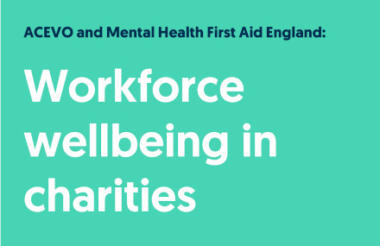The pandemic has worsened existing mental health challenges for staff in voluntary organisations, a report has found.
ACEVO and Mental Health First Aid England released a summary report, Workforce Wellbeing in Charities, of a project exploring workforce wellbeing in the charity sector.
The report finds that the coronavirus pandemic has blurred the boundaries between personal and professional life and rising demand for services has made the existing strain on mental health even greater.
Its findings are based on conversational evidence from discussions between CEOs about their time working in the sector. The project began in November 2019 and completed in June 2020.
Charity-specific features
It found charity staff were facing additional issues accessing mental health support, and a working group identified specific features of the voluntary sector that can make workforces particularly vulnerable to mental ill-health.
These features include that charities exist for public benefit, and delivering their mission is their first priority.
It is also not uncommon for staff salaries to be dependent on specific pots of funding or contracts which can end at short notice.
There is also a narrative of poor public trust in charities and excessive spending often frames staff salaries as an unnecessary expense. This can embed anxieties about sustainability of roles and organisations, and contribute to high staff turnover.
Another aspect is that people’s commitment can come from lived experience or a personal connection to an issue, “which can make their day-to-day work emotional, triggering or distressing”.
Charity leaders struggle to balance interests
The report also shows that charity leaders can struggle to find a balance between authentic openness and a professional focus on business interests, “causing personal feelings of shame and inadequacy”.
The report states: “Expressing vulnerability and being approachable can mean feeling pressure to ‘rescue’ the people within the organisation who need support. These feelings are in constant tension for charity leaders. They feel acute pressure to be personable, and guilt when they cannot be.”
This has again been worsened by Covid-19. Leaders have felt acute pressure to compensate for difficulties their workforces face at the expense of their own mental health.
Most first-time chief executives will start in smaller or younger organisations, and these organisations can also lack infrastructure and second-in-command support.
Boards must take on more responsibility for mental health
The report recommends that boards must take greater responsibility for mental health and wellbeing within organisations, specifically recommending that at least one member of the board should take responsibility for organisational wellbeing.
Vicky Browning, chief executive at ACEVO, said: “We started this project because we were aware that a number of chief executives were struggling with workforce mental health on a day-to-day basis.
“The working group soon broadened their discussions to encompass the mental health of the chief executives themselves. Chief executives have a duty of care to the people they work with and for, but also to themselves.”
Related articles













